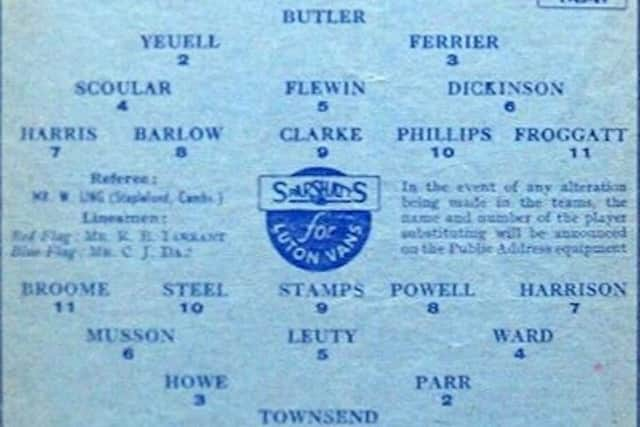Fratton Park’s record-breaking day – Nostalgia


Tim King, a former Portsmouth Evening News reporter, was aged nine when his father took him to the match. He recounts the events of the day.
‘I was one of the 51,385 that jammed into Fratton Park on that magical day on February 26, 1949. I was taken there by my dad and an uncle.
Advertisement
Hide AdAdvertisement
Hide Ad‘Although most fans arrived on fleets of football special corporation buses, large numbers cycled and the people who lived in Alverstone Road, which backed on to an alleyway behind the Milton End, made a small fortune looking after hundreds of bikes in their back yards.


‘We had arrived about two hours before kick-off having parked the car in Velder Avenue.
‘We took our places against railings about half a dozen steps up the terrace below the North Stand, but as the ground rapidly filled and the stewards packed the fans more tightly, my view was gradually blocked.
‘Seeing our plight, it was then that kindly fans in front hoisted me and scores of other youngsters above their heads and passed us down to the front where, in those days, we were allowed to sit on the low wall that separated the pitch from the terraces. When I think about what happened at Hillsborough, health and safety would have had a field day.
Advertisement
Hide AdAdvertisement
Hide Ad‘As I recall, at that stage of the season Pompey were top of the First Division and The Rams were third, and they had a wealth of gifted players such as Raich Carter and Jackie Stamps, the latter giving them the lead a few minutes before half-time.
‘A couple of minutes later, Pompey were level with Jimmy Dickinson sending Jack Froggatt away down the left. He beat the Derby full-back and centred a perfect cross for Ike Clarke to head into the net. And it was Clarke who fired Pompey into the semi-final about 10 minutes from the final whistle.
‘It took ages to get away from the ground, there were huge queues for the buses and fans who retrieved their bikes then did a replay of the Dockyard out muster.’
The team sheet tells us that Pompey played an attacking game with five forwards and three half-backs. Oh to see it today. They also played in royal blue shirts and white knickers.
Advertisement
Hide AdAdvertisement
Hide Adn As any of my friends know, I do not have half an ounce or an inch of what is now called political correctness in my veins.
However, watching a war film on afternoon television last week my jaw actually dropped.
James Robinson Justice was playing the lead roll in the film Very Important Person, about a German PoW camp in the Second World War. He played the part of the scientist Sir Ernest Pease.
One day Pease had to cook what rations were available and after eating it his room-mates said how good it tasted.
Advertisement
Hide AdAdvertisement
Hide AdPease then turned and said: ‘It doesn’t take a lot of intelligence to cook, that’s why women are so good at it’. I kid you not. Yes, even I was somewhat gobsmacked. The fairer sex would have a field day if that was said today. And quite rightly.
n Last September I wrote about living on boats on the foreshore along Eastern Road. It was seen by Pamela Middleton (nee Savage) who now lives in Australia. She emailed me the following:
‘My sister and I were brought up on MTB 657, which l believe my dad bought in Chichester in 1947 and had it towed to Portsmouth.
‘My sister was born in 1943 and I was born in 1948 and we lived together with our parents Mr and Mrs H Savage, and our dog Toby.
Advertisement
Hide AdAdvertisement
Hide Ad‘We had a sailing dinghy moored alongside which we used to sail to Hayling Island when weather and tides permitted. Occasionally we would miss the tide and end up sitting in the middle of Langstone Harbour on the sandbanks for hours waiting for the tide to turn.
‘The boat was called Houseboat Sparrow, named after my mother's nickname during the war.
‘This was a lovely community. I can remember a few names – Mr and Mrs G Sparkes and their son David, and Mr and Mrs Robbins and their daughter. Everyone helped each other when needed, be it storm damage or gangplanks breaking.
‘We lived very happily there until 1955 when my sister Mary told me that our parents had a secret – she thought that we were either going to have a television or we were going to move to a house. Sadly we moved to a new house in Farlington and I cried a lot.
‘My dad died in 1968 and my mum and sister have also since passed away. I live in Australia with my husband, son and daughter and five grandchildren.’